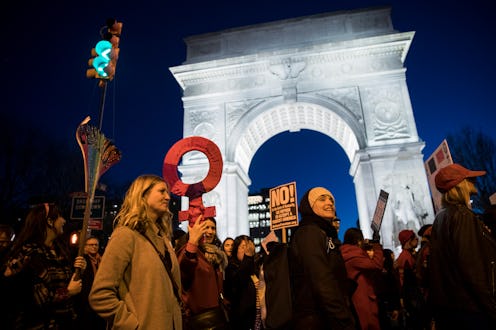News
Here's What A Day Without A Woman Looked Like

Women across the country skipped work and held off spending money on “A Day Without A Woman” on Wednesday, March 8 to demonstrate economic solidarity and resistance against institutional sexism. Held on International Women’s Day, the event saw strikes and rallies across various cities, including New York, San Francisco, Philadelphia, and Washington, D.C.
Well-intentioned as the strike was, the practical fact of the matter remains: Many women could not — and cannot — afford to take time off paid or unpaid work. For minimum-wage workers and caregivers, for example, taking a day off would cause more grief than good. And mothers cannot refuse to take care of their children for a day without calling on others to help. Indeed, for two women in New York City, strike day looked very different.
Stacy Fuller, 39, who works at an advertising agency, took the day off. “To assert myself and say I’m not working today, that this is important to me -- it was pretty nerve-wracking,” she tells Bustle. She spent the day at two rallies with her mother and some friends.
But for Shara Harad-Oaks, 29, a social worker at Brownsville Academy High School in Brooklyn, it was very much business as usual: She headed to school at 7 a.m., finished up administrative tasks, and held counseling appointments with students.
“I’m not striking, because if I didn’t show up it would be a disservice to the students I’m working with,” she says to Bustle. “Without women at this school, it would be a ghost town. Things just wouldn’t be moving.”
The strike’s organizers urged those who couldn’t participate to wear red in solidarity, and to only shop at women- or minority-owned businesses for the day. In the same vein, Harad-Oaks demonstrated her support on the day by encouraging the students in her Women’s Empowerment Group at school to wear pink makeup and write letters to members of Congress.
Though participation in the nationwide rallies didn’t reach the fever pitch of the Women’s March in January, the women who took part were still adamant about the cause.
“I recognize my privilege in being able to take a day off from work,” says Fuller. “But I think it’s our responsibility as women to support other women. If we’re not pushing the issue [of women’s rights], who else is going to?”